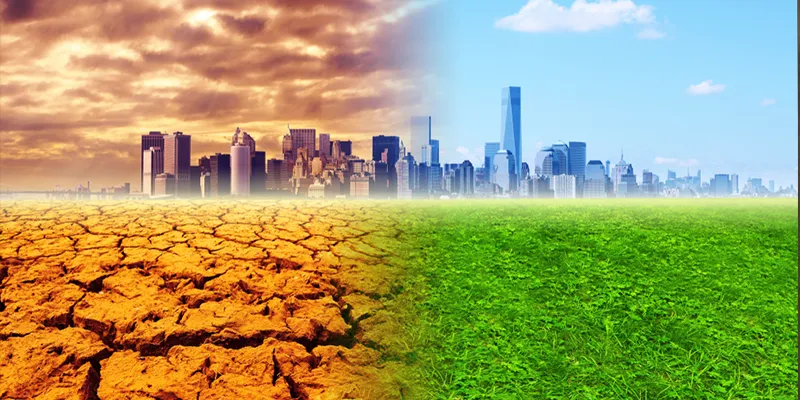Why corporates need to step up on climate change response
The solutions suggested are huge changes in the way we use lands, generate energy, run our industry, build and use our buildings and transport.
“An ear-splitting wake-up call to the world” is how the UN chief Antonio Guterres had described the Special Report of the Inter-Governmental Panel on Climate Change (IPCC) that was released in October last year. The UN chief further added that climate change is running faster than we are, and we are running out of time.
The landmark Paris Agreement in December 2015 adopted by 191 nations at the 21st Conference of Parties (COP 21) to the UN framework convention on climate change had set out a set of actions by the community of nations, the sum total of which will hold the increase in the global average temperature to below two-degrees centigrade above the pre-industrial levels.

The special report goes on to demonstrate on the basis of data and models developed by hundreds of scientists how our temperature rise of even 1.5-degrees can make a devastating impact on life on earth. This will include irreversible changes such as loss of many forests and other natural ecosystems.
The report further goes on to say that allowing the global temperature to overshoot 1.5-degrees centigrade, would mean a greater reliance on technology that would remove CO2 from the atmosphere and at increasingly higher costs. The report calls for huge changes in the use of land, energy, industry, buildings, transportation, etc. across cities all over the world. If life were to continue on planet earth, global net emissions of carbon dioxide would need to fall by 45 percent from the base year of 2010 by 2030. The sum total of all actions that were committed at COP-21 in Paris is not likely to take us anywhere near this urgent need for reaching net zero emissions of CO2.
To put it in a nutshell, global warming at current trends will have devastating effects on human life, health, food, housing, and water. This will usher in a higher frequency of storms and cyclones with higher energies, droughts and altered weather patterns resulting in crop loss, a spike in disease-bearing vectors and pathogens. Small island nations and coastal regions are under the threat of submergence.
This is indeed a frightening scenario and calls for urgent action by the community of nations and businesses from across the world to come together in coordinated efforts to bring in commitment, technology, knowledge resources, and sharing of responsibilities to address the situation.
While the community of nations through the UN platform of UNFCCC has come out with a set of commitments to address climate change, the question that is often asked is whether businesses contribute to climate change and do they have a responsibility to play a role in climate mitigation and adaptation.
To answer this, we need to look at the levels of CO2 in the atmosphere from the beginning of the industrial revolution and the trends in overall average temperature rise. In the pre-industrial revolution, the CO2 level was 270-280ppm and then on, triggered by a great spike in the burning of coal and other fossil fuels, CO2 levels moved up to 315ppm in 1958.
A phenomenal rise in the burning of fossil fuels in the second half of 20th century to meet the energy needs has taken this level to 415ppm as on today.
Correspondingly, the average temperature has gone up by more than 1-degree centigrade. Contemporary energy requirements of the globe, urban lifestyles, extraction of water, landfills for urban waste and plastic is adding a further 3ppm of CO2 each year. Climate models suggest that when CO2 levels touch 450 ppm, the temperature rise will go beyond 2-degree centigrade.
Against this scenario, the solutions suggested are huge changes in the way we use lands, generate energy, run our industry, build and use our buildings and transport. Each time a forest land is razed to build cities or industries, there is a net release of CO2 into the atmosphere.
Energy requirements from thermal plants and inadequate infusion of technology into thermal plants add to the spike in emissions. So clearly, we have a situation where industrial activity and urban lifestyles combined with a voracious appetite for converting natural ecosystems into industrial hubs is a great contributor to the growth in emission levels of CO2.
While governments come out with policy instruments such as licensing, taxation, incentives, to enable a nation to meet its commitments made at COP 21, real outcomes from these measures are possible when businesses comply with these policy interventions and further come out with voluntary actions that will contribute to,
- Curbing emissions
- Contribute to the creation of carbon sink
- R&D to bring in technologies that will reduce emissions
- Develop products that are low on the carbon footprint
- Engage workers and employees to encourage responsible citizens.
- Pooling resources and efforts to contribute to respective sovereign climate commitments
Why do corporates need to step up on the Climate Change response?
Modern-day economies are familiar with the adage “Men may come and men may go, but I go on forever” referring to ‘The Brook’ to describe a modern day public limited company. These businesses draw their resources by way of capital, manpower, land, and ideas from the society into which the company, in turn, sells its products. Such continuity of these businesses is possible only when the society is stable and thriving. Governments and businesses have tried to address the complex issue of climate change by adopting practices like car – pooling, ban of plastics, increased use of cloth and paper bags, and increased digitization. However, the fact is that a combination of tokenism and practices based on inadequate/incorrect application of knowledge has resulted in a frightening spike in Green House Gases (GHGs) since 2016, so much so that just 11 years from now, we will breach the dreaded 1.5 degrees C.
It is in the interest of the business to step up and ensure a stable society that is a model of responsible use of land, water and human resources endowed with good natural resources that foster the climate for the development of human societies and businesses.
(Disclaimer: The views and opinions expressed in this article are those of the author and do not necessarily reflect the views of YourStory.)









